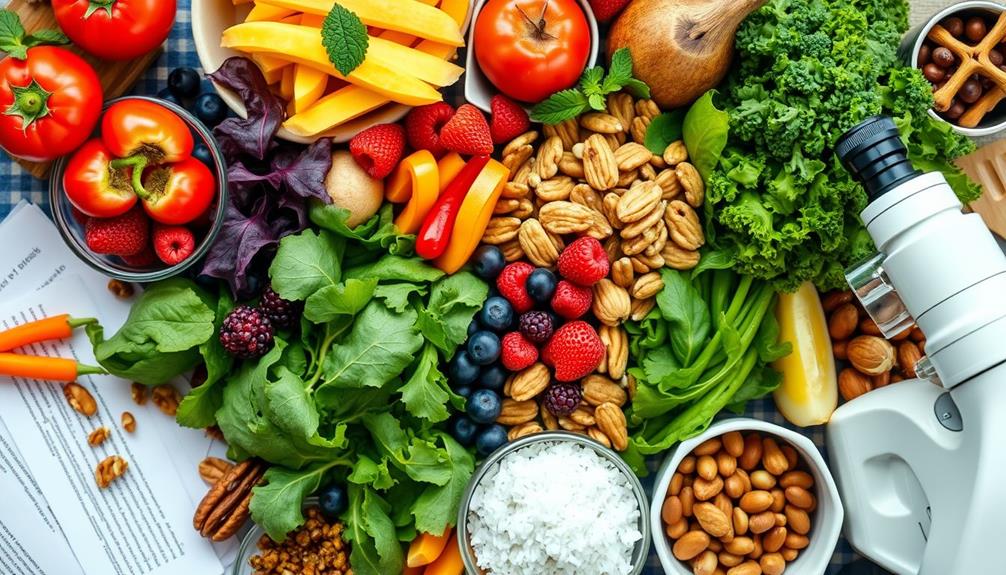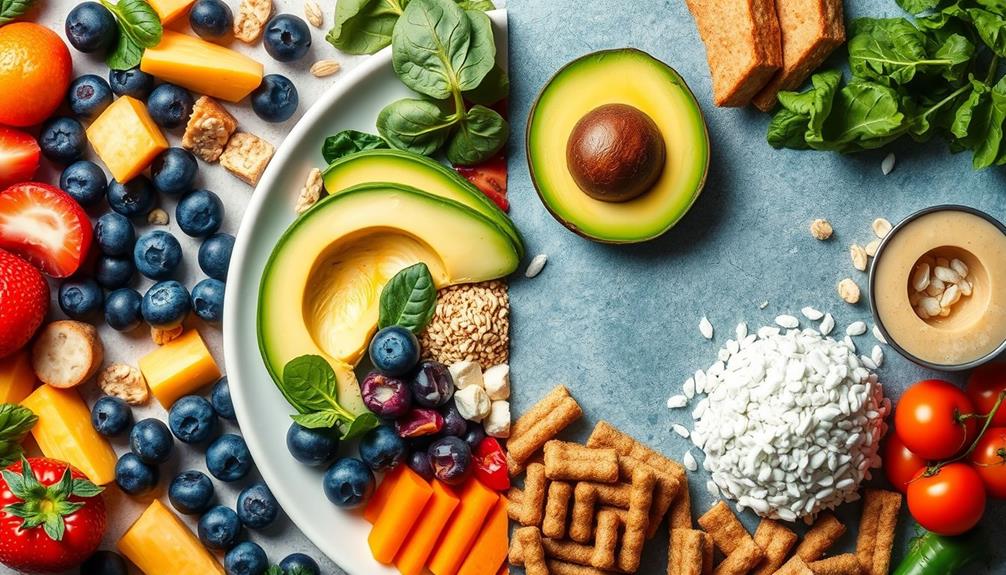Nutrition plays a significant role in managing Parkinson's disease. You should focus on eating antioxidant-rich fruits, leafy greens, and omega-3 fatty acids from fatty fish to support brain health. High-fiber foods can help with constipation, while whole grains promote overall well-being. Avoid dairy products, added sugars, and processed foods, as these can worsen symptoms and increase inflammation. Staying hydrated is essential too; aim for 6-8 glasses of water daily. By making these dietary adjustments, you can potentially improve your health and the management of your condition. There's much more to explore regarding dietary choices and their effects.
Key Takeaways
- Eat antioxidant-rich foods like leafy greens, berries, and nuts to protect brain cells and combat oxidative stress associated with Parkinson's disease.
- Incorporate omega-3 fatty acids from fatty fish to reduce inflammation and support cognitive function, potentially alleviating some symptoms.
- Limit intake of dairy products and high saturated fat foods, as these may exacerbate symptoms and contribute to faster disease progression.
- Avoid processed foods and added sugars, which can disrupt energy levels and worsen overall health and symptom management.
- Stay hydrated by drinking 6-8 glasses of water daily to prevent dehydration and support medication effectiveness and digestive health.
Overview of Parkinson's Disease

Parkinson's disease creeps in silently, often starting years before you notice its effects. This progressive neurological disorder primarily affects movement, leading to symptoms like tremors, rigidity, and balance issues.
It's important to recognize that the disease is the second most common neurodegenerative condition, impacting over 1 million people in the U.S. alone, with incidence increasing as people age. A nutritious diet rich in antioxidants and vitamins, similar to those found in celery juice, may provide additional health benefits for individuals facing this condition.
The symptoms of Parkinson's can be subtle at first, making early diagnosis a challenge. You mightn't realize what's happening until the disease has progressed considerably. Non-motor symptoms, such as depression, anxiety, and sleep disturbances, can also emerge, complicating the overall picture and affecting your quality of life.
Currently, there's no definitive test for Parkinson's disease; diagnosis relies on clinical evaluation and medical history. Understanding the disease and its symptoms is essential for managing its progression.
While treatment options exist, including medication and therapy, incorporating healthy nutrition into your daily life can also play a considerable role in how you face the challenges of Parkinson's. A well-balanced diet may help support your overall health as you navigate this complex disease.
Role of Nutrition in Management

Nutrition plays a vital role in managing Parkinson's disease symptoms. By focusing on essential nutrients and avoiding certain foods, you can greatly impact your health and well-being.
A balanced diet rich in fruits, vegetables, and whole grains can provide the necessary antioxidants and vitamins that may help alleviate some symptoms. Understanding what to include and what to limit in your diet is key to improving your quality of life, as certain dietary choices can also influence inflammation and overall brain health importance of selecting the right cold medication for effective relief.
Dietary Impact on Symptoms
Managing Parkinson's disease often involves considering how what you eat can influence your symptoms. A healthy diet is vital to help manage the symptoms of Parkinson's disease. Foods rich in antioxidants, like fruits and vegetables, can combat oxidative stress and may slow the progression of the disease. Additionally, incorporating omega-3 fatty acids from sources like fatty fish can improve cognitive function and alleviate symptoms.
However, it's important to be mindful of what you avoid. Excessive saturated fats and processed foods can worsen symptoms and should be limited. Staying hydrated is equally significant; aim for 6-8 glasses of water daily, as dehydration can intensify fatigue and confusion.
Lastly, timing your protein intake is vital. High-protein meals can interfere with the absorption of medications like carbidopa-levodopa, so plan your meals accordingly.
Here's a quick overview of dietary considerations:
| Foods to Eat | Foods to Limit | Hydration Tips |
|---|---|---|
| Fruits and vegetables | Processed foods | Drink 6-8 glasses daily |
| Fatty fish | Saturated fats | Monitor fluid intake |
| Whole grains | High-fat dairy | Include hydrating foods |
Essential Nutrients to Include
While a well-rounded diet can markedly impact your health, including essential nutrients is essential for effectively managing Parkinson's disease. Focus on incorporating these key elements into your daily meals: Adequate intake of foods rich in antioxidants, such as fruits and vegetables, can help combat oxidative stress associated with the disease. Additionally, ensuring sufficient omega-3 fatty acids from sources like fish and flaxseeds may support brain health. For more personalized guidance, consider following specific nutrition tips for Parkinson’s patients, which focus on optimizing nutrient absorption and managing common symptoms such as constipation and changes in appetite.
1. Antioxidants: Load up on fruits and vegetables, whole grains, and nuts to combat oxidative stress and slow disease progression.
A balanced diet rich in fruits and vegetables can play a significant role in lifestyle for longevity and overall well-being.
2. Omega-3 Fatty Acids: Include fatty fish like salmon and mackerel in your diet to reduce inflammation and support cognitive function.
3. Protein Intake: Aim for at least 0.8 grams of protein per kilogram of body weight.
Timing your protein consumption around medications like levodopa can improve medication absorption.
4. Gut Health: Incorporate probiotic-rich foods such as yogurt and fermented vegetables to promote gut health, which plays a fundamental role in overall brain health.
Foods That Worsen Conditions
Certain foods can considerably impact your health when managing Parkinson's disease. High saturated fat foods like beef, butter, and cheese may increase inflammation and neurodegeneration, potentially worsening Parkinson's symptoms. It's wise to limit these fats in your diet.
Additionally, incorporating essential oils for symptom relief may provide complementary support in managing discomfort associated with the disease.
Processed foods, such as canned goods and sugary snacks, can exacerbate symptom severity. These items often contain unhealthy additives that may contribute to your overall decline in health.
Similarly, foods high in sugar can lead to energy spikes and crashes, disrupting your energy levels and making symptom management more challenging.
Dairy products, especially skim and low-fat options, have been linked to a faster progression of Parkinson's. It might be best to avoid these if you're looking to manage your condition effectively.
Additionally, excessive caffeine intake can increase anxiety and worsen non-motor symptoms, so it's important to keep your caffeine consumption in check.
Beneficial Foods to Include

Incorporating beneficial foods into your diet can have a significant impact on managing Parkinson's disease. Focusing on nutrient-dense options can help you feel better and maintain your health. Here are some foods to include in your meals:
1. Antioxidant-rich foods: Leafy greens, berries, and nuts help protect your brain cells and may slow disease progression.
Additionally, herbal teas like chamomile can promote relaxation and may be beneficial for overall well-being, supporting your natural stress relief.
2. Omega-3 fatty acids: Fatty fish like salmon and mackerel can alleviate symptoms and support cognitive function.
3. High-fiber foods: Fruits, vegetables, and legumes not only provide sustained energy but also help manage constipation, a common issue in Parkinson's patients.
4. Fermented foods: Yogurt and sauerkraut support gut health, enhancing your overall well-being and benefiting your brain through a healthier gut microbiome.
Additionally, including fava beans in your diet is beneficial as they contain levodopa, which can aid in motor performance without the side effects of traditional medications.
Adopting a Mediterranean diet rich in lean protein and healthy fats, while monitoring your dietary fat intake, can also help with Parkinson's.
Make these changes today to support your health!
Foods to Avoid

When managing Parkinson's disease, being mindful of your food choices is essential for maintaining health and well-being. There are certain foods to avoid that can help you manage your symptoms more effectively.
First, limit high saturated fat foods like beef, butter, and cheese, as they may increase the risk and severity of your symptoms. Additionally, maintaining a balanced budget for healthy eating can support your nutritional needs.
Processed foods, particularly sugary snacks and fast food, should also be avoided since they can lead to rapid progression of symptoms.
Dairy products, especially low-fat and skim options, may correlate with faster disease progression, so it's best to minimize these in your diet. Foods high in added sugars can cause energy spikes and crashes, negatively impacting your overall well-being, so consume them sparingly.
Additionally, tough meats and difficult-to-chew foods can complicate your eating experience. Opting for softer options can make meals easier and more enjoyable.
Importance of Hydration

Managing your diet goes hand in hand with staying properly hydrated, especially for individuals with Parkinson's disease. Adequate hydration is vital, as medications can lead to dehydration, resulting in fatigue, confusion, and balance issues.
Staying informed about financial considerations for elderly care can also help manage health-related expenses effectively. Aim for 6-8 glasses of water daily to support your overall health and symptom management.
Here are four essential reasons to prioritize hydration:
- Prevent dehydration: It can exacerbate symptoms and lead to serious complications.
- Combat constipation: Regular fluid intake helps maintain digestive health, a common concern in Parkinson's patients.
- Support kidney function: Dehydration increases the risk of kidney problems and hospitalization.
- Boost energy levels: Consuming electrolyte-rich fluids can help maintain your energy throughout the day.
Lifestyle Tips for Patients

Staying active and hydrated is key to managing Parkinson's disease. Regular exercise boosts your mobility and balance, while drinking enough water helps combat fatigue and confusion.
Incorporating gentle stretching before bedtime can also promote relaxation and improve sleep quality, which is essential for overall health. Additionally, practicing deep breathing techniques may help reduce tension and enhance your sense of well-being, as suggested in Yoga for Back Pain.
Exercise Regularly
Regular exercise plays an essential role in managing Parkinson's disease, as it can greatly enhance your gait, balance, and overall motor coordination. By engaging in regular physical activity, you can improve your mobility and alleviate common symptoms like stiffness and bradykinesia. This not only fosters better independence in daily activities but can also slow disease progression.
Additionally, incorporating primitive weapons for modern survival into your routine can promote creativity and adaptability, mirroring the benefits of diverse exercise approaches.
To make the most of your exercise routine, consider these four key points:
- Incorporate cardiovascular workouts: Activities like walking, cycling, or swimming boost heart health and neuroplasticity.
- Establish a structured routine: Consistency is crucial for maintaining physical fitness and combating fatigue associated with Parkinson's disease.
- Mix it up: Combine structured exercises with everyday physical activities to keep your body engaged and motivated.
- Focus on the benefits: Regular exercise can improve your overall health, mood, and quality of life, making each day more fulfilling.
Embracing a regular exercise routine can make a significant difference in your journey with Parkinson's disease, helping you live a more active and enjoyable life.
Stay Hydrated
Hydrating properly is essential for maintaining your health when living with Parkinson's disease. Aim for a daily fluid intake of 6-8 glasses of water to support overall hydration. This is critical because dehydration can exacerbate symptoms like fatigue, confusion, and balance issues.
To combat these risks, monitor your fluid intake consistently throughout the day. Additionally, understanding the differences between espresso and coffee can help you make healthier beverage choices that contribute to your hydration efforts.
Parkinson's medications may increase your risk of dehydration, making it even more important to stay hydrated. Incorporating electrolyte-rich fluids can enhance your hydration, especially during hot weather or physical activity. These fluids not only hydrate but also help maintain your overall health.
Don't forget that regular hydration plays a significant role in your digestive health. It can alleviate constipation, which is a common issue among individuals with Parkinson's disease.
To guarantee you're getting enough fluids, consider setting reminders or using a water bottle to track your intake.
Ongoing Research and Insights

Exploring the latest research reveals promising insights into how nutrition can influence Parkinson's disease management. A diet high in fruits, vegetables, and whole grains, similar to the Mediterranean diet, may offer protective benefits against developing Parkinson's.
Studies show that consuming more antioxidants from foods like berries and leafy greens can help reduce oxidative stress, potentially slowing disease progression.
Here are four key takeaways from ongoing research:
- Gut Microbiome: A diverse gut microbiome, supported by probiotic-rich foods, may enhance brain health and symptom management.
- Omega-3 Fatty Acids: Found in fatty fish, these acids can reduce inflammation and bolster cognitive function in Parkinson's patients.
- Vitamins: Continuous evaluation of vitamins B1, C, D, and omega-3s is essential for understanding their effects on managing Parkinson's symptoms.
- Dietary Patterns: Adopting a diet high in antioxidants and anti-inflammatory foods can greatly impact your overall health and well-being.
Staying informed about these developments can empower you to make dietary choices that might improve your quality of life while managing Parkinson's disease.
Frequently Asked Questions
What Food to Avoid in Parkinson's Disease?
You should avoid processed foods, high saturated fat items, sugary snacks, and tough meats. These can worsen symptoms and make eating more difficult, so focus on easier-to-chew, healthier options for better overall well-being.
What Diet Is Best for Parkinson's Disease?
You'll find a balanced diet rich in fruits, vegetables, whole grains, and lean proteins best for overall health. Emphasizing plant-based foods and healthy fats can greatly enhance your well-being and support brain function.
What Foods Are High in Dopamine for Parkinson's Disease?
Did you know that bananas contain about 0.5 grams of dopamine per 100 grams? You can boost your dopamine levels by enjoying bananas, avocados, and dairy products, while also considering fava beans for added benefits.
What Aggravates Parkinson's Disease?
Certain factors can aggravate your condition. High saturated fats, processed foods, excessive caffeine, and alcohol can worsen symptoms. Additionally, tough-to-chew foods may complicate your meals, making it harder to maintain proper nutrition and health.
Conclusion
In summary, managing Parkinson's disease involves more than just medication; it's about embracing a holistic approach that includes mindful nutrition. By focusing on beneficial foods and staying hydrated, you can enhance your quality of life. Remember, even ancient philosophers like Hippocrates recognized that "let food be thy medicine." So, as you navigate your journey, prioritize what you eat and drink, and stay proactive in your health choices. Your body—and mind—will thank you.









